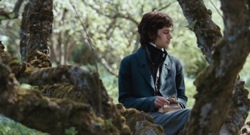“A poem needs understanding through the senses. The point of diving in the lake is not immediately to swim to the shore, but to be in the lake, to luxuriate in the sensation of water. You do no work the lake out. It is an experience beyond thought. Poetry soothens and emboldens the soul to accept mystery.” (Keats to Fanny in a lesson on poetry.)
Bright Star (2009) asks us to luxuriate, through our senses, in the experience of being in the film. The philosophy of accepting mystery and enjoying our time while we are “inside” the poem is reminiscent of John Keats’ actual theory of negative capability, but also to his “Ode to a Nightingale,” which Keats composes and narrates at one point about halfway through the movie. In “Ode to a Nightingale‚” the poet uses his imagination and the “wings of Poesy‚” (33) to temporarily enjoy being in a world of something better, higher, something not of our regular earthly existence, where “youth grows pale, and spectre-thin, and dies‚” (26). Later on in his experience, the word “Forlorn” brings the poet back to his more earthly senses, and the poem ends.
This bet ter, higher world is the one inhabited and embodied by Keats in Bright Star, and our experience with him is only brief. At the beginning of the film, we are concerned with the death of Keats’s brother (the youth in the Ode who “grows pale, and spectre-thin, and dies‚”). Briefly, we experience the courtship between Keats and Fanny, and their somewhat idealized love. Keats, attempting to describe his feelings to Fanny, says, ‚”I want a brighter word than bright, fairer word than fair.” The end of the film brings us back to reality: Keats is often abroad, unreachable, while Fanny is forlorn. Keats grows sick and dies.
ter, higher world is the one inhabited and embodied by Keats in Bright Star, and our experience with him is only brief. At the beginning of the film, we are concerned with the death of Keats’s brother (the youth in the Ode who “grows pale, and spectre-thin, and dies‚”). Briefly, we experience the courtship between Keats and Fanny, and their somewhat idealized love. Keats, attempting to describe his feelings to Fanny, says, ‚”I want a brighter word than bright, fairer word than fair.” The end of the film brings us back to reality: Keats is often abroad, unreachable, while Fanny is forlorn. Keats grows sick and dies.
Fellow poet Brown recognizes that Keats is the better writer. But Keats is also a better man, who lives up to a higher ideal. While Keats refuses to breach the walls of propriety with Fanny, Brown impregnates a maid. “With what ease you help yourself,” Keats notes, not angry, but genuinely perplexed. Later in the film, Brown too will realize that the difference between the two men goes beyond their skill in poetry.
The film touches only briefly on the agony and depression that Keats suffered, and their effects upon his mental health. Its focus is on the beauty of his life. The imagery is often of the English countryside; gentles breezes coming in through open windows cause white curtains to flutter carelessly, like the butterflies that Fanny and her sisters start collecting. The soundtrack makes you want to close your eyes and luxuriate in the music, as Keats does when he listens to the singing nightingale and composes his ode.
Keats died at the age of 25 (a horrible, long suffering death), yet he became one of the great English poets, on only a small body of work. Keats wrote “Bright Star” about Fanny, but the title of the film might equally apply to either Fanny or Keats, or simply to their experience together. Percy Shelley’s famous elegy for Keats ends: “The soul of Adonais, like a star, / Beacons from the abode where the Eternal are‚” (495-496). We look back on the short life of Keats, and see in him the embodiment of a Romantic ideal, a bright star. Whether that is at all fair to the man that Keats really was, I’m not sure.
